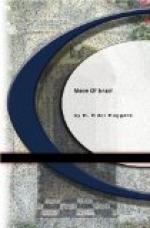“I have dreamed a dream!” she cried. “I dreamed that I saw all the thousands of my people following after a flame that burned from earth to heaven. They came to the edge of a great water and behind them rushed Pharaoh and all the hosts of the Egyptians. Then my people ran on to the face of the water, and it bore them as though it were sound land. Now the soldiers of the Pharaoh were following, but the gods of Egypt appeared, Amon, Osiris, Horus, Isis, Hathor, and the rest, and would have turned them back. Still they refused to listen, and dragging the gods with them, rushed out upon the water. Then darkness fell, and in the darkness sounds of wailing and of a mighty laughter. It passed, the moon rose, shining upon emptiness. I awoke, trembling in my limbs. Interpret me this dream if you can, O Ki, Master of Magic.”
“Where is the need, Lady,” he answered, awaking as though from sleep, “when the dreamer is also the seer? Shall the pupil venture to instruct the teacher, or the novice to make plain the mysteries to the high-priestess of the temple? Nay, Lady, I and all the magicians of Egypt are beneath your feet.”
“Why will you ever mock me?” she said, and as she spoke, she shivered.
Then Bakenkhonsu opened his lips, saying:
“The wisdom of Ki has been buried in a cloud of late, and gives no light to us, his disciples. Yet the meaning of this dream is plain, though whether it be also true I do not know. It is that all the host of Egypt, and with it the gods of Egypt, are threatened with destruction because of the Israelites, unless one to whom they will hearken can be found to turn them from some purpose that I do not understand. But to whom will the mad hearken, oh! to whom will they hearken?” and lifting his great head, he looked straight at the Prince.
“Not to me, I fear, who now am no one in Egypt,” said Seti.
“Why not to you, O Prince, who to-morrow may be everyone in Egypt?” asked Bakenkhonsu. “Always you have pleaded the cause of the Hebrews, and said that naught but evil would befall Egypt because of them, as has happened. To whom, then, will the people and the army listen more readily?”
“Moreover, O Prince,” broke in Ki, “a lady of your household has dreamed a very evil dream, of which, if naught be said, it might be held that it was no dream, but a spell of power aimed against the majesty of Egypt; such a spell as that which cast great Amon from his throne, such a spell as that which has set a magic fence around this house and field.”
“Again I tell you that I weave no spells, O Ki, who with my own child have paid the price of them.”
“Yet spells were woven, Lady, and has been known from of old, strength is perfected in sacrifice alone,” Ki answered darkly.
“Have done with your talk of spells, Magician,” exclaimed the Prince, “or if you must speak of them, speak of your own, which are many. It was Jabez who protected us here against the plagues, and the statue of Amon was shattered by some god.”




